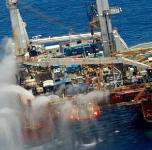Closing Big Oil's Drilling Safety Loopholes
 Companies privileged to produce oil and gas in America’s waters need to respect the responsibility that accompanies that privilege.
Companies privileged to produce oil and gas in America’s waters need to respect the responsibility that accompanies that privilege.Think of the Interior Department’s new offshore drilling rules as a product recall.
Recalls are initiated when something is wrong with a company’s product and that something needs fixing sooner rather than later.
The blowout of BP’s Macondo well and the consequent spill of some 4.9 million barrels of oil is a sign that something is wrong with deepwater oil production and it needs fixing.
Until that something is fixed, it wouldn’t be prudent to continue stamping out drilling permits at the express checkout line that the bureaucrats call “categorical exclusion.”
A categorical exclusion is a determination that a project won’t have much of an environmental impact and can go ahead without a detailed assessment.
Before the Macondo well popped its cork, the Interior Department agency formerly known as the Minerals Management Service was cranking out deepwater drilling permits under categorical exclusions about as fast as the paperwork could be stamped. Macondo was the beneficiary of one of those exclusions.
On Monday, Interior announced it plans to hold off giving such exclusions for deepwater drilling permits until it figures out a new game plan for overseeing offshore oil production. That figuring out will run parallel to ongoing probes into causes of the big spill.
Sure, it all sounds like a bureaucratic grind, and it’s not to the liking of an impatient deepwater oil industry that is accustomed to deferential treatment by friendly regulators.
Excessive deference is no longer appropriate and deepwater drilling permits that get little more than a lick and a promise from the permit writers will no longer do. The Macondo spill and the 2009 blowout in the Timor Sea are worrisome signs that deepwater well control problems are more difficult than the industry has let on, and its assurances of adequate spill control capability are less credible than the industry would have the public believe.
The federal government’s job is to make sure that companies privileged to produce oil and gas in America’s marine waters respect the responsibility that accompanies that privilege. The consequences of corner cutting, sloppy practices and inadequate spill response capability are too great—ask any of the Gulf Coast communities suffering from a lost summer in the fishing and tourism industries.
The industry is moaning that delays in putting its rigs and crews to sea again will result in costly delays. Like manufacturers forced into product recalls, they’d rather be on the market moving product than pulling back for do-overs.
C’est la vie. Better to be responsibly safe than sorry with screw-ups that kill people and pollute the ocean. Whatever went wrong a mile below must be identified and steps taken to make sure it doesn’t happen again.